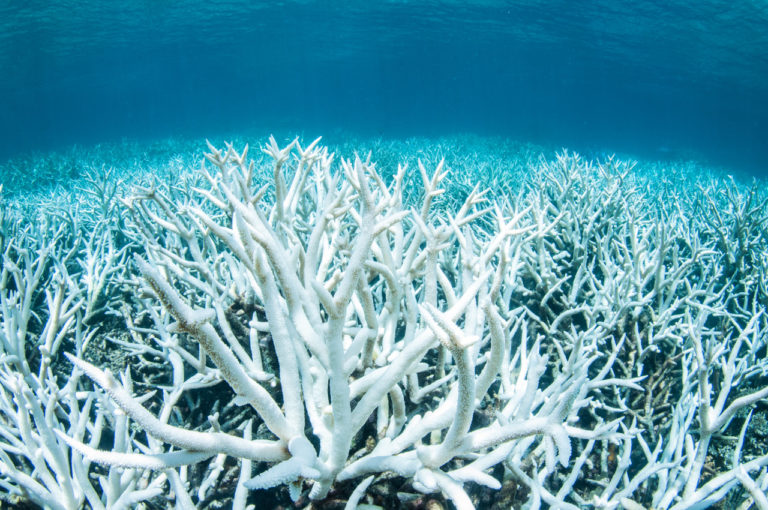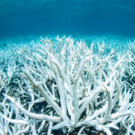Some corals stand a chance of surviving the current rise in global sea temperatures, a team of scientists recently reported, thanks to the diversity of their algal counterparts. They found…
The local fishermen looked on skeptically. From the deck of a small motorboat, scuba divers grabbed odd chunks of ceramic – which could be described as rocky brains stuck on…
New research confirms the fragility of life living in the world’s oceans, which are growing warmer and more acidic as carbon dioxide levels rise. The carbon dioxide that ends up…
The islands and atolls of the northern Caribbean are home to a vast constellation of coral reefs. The region harbors 59 species of hard corals, representing about 7 percent of…
TOULOUSE, France -- Rats exact a punishing toll on island seabird colonies, decimating their numbers as they eat the birds’ eggs and young. Research has shown that fewer birds, and…
Amid all the gloomy news about coral reefs from around the world, a glimmer of hope has emerged: scientists have identified coral reef “oases” that are flourishing despite threats. From…
PUNTA CANA, Dominican Republic — At 8 o’clock on a May morning the Caribbean Sea was calm, offering a clean window to the underwater realm. Flying 2,000 meters (6,560 feet)…
Coral reef conservation efforts will soon get a major boost with a global monitoring system that will detect physical changes in coral cover at high resolution on a daily basis,…
Fish talk. They boom, buzz, croak, and chatter. They even create a dawn chorus similar to birds. Shrimp vocalize too, by snapping and popping. A reef’s soundscape—the variety of sounds…
The Australian Government has announced more than 500 million Australian dollars ($379 million) in funding to protect the Great Barrier Reef. This "represents the single largest investment for reef conservation and…
The Galápagos Islands are not widely known for their coral reefs. Most visitors to the islands’ waters seek big charismatic residents like sharks, manta rays, sea lions and whales, or…
A recent report tracking the health of the Mesoamerican Reef indicates that conservation efforts might be helping to turn the tide for the reef itself and the people who depend…
The tropical Caribbean island of Haiti is a paradise with a rich, fascinating history, natural wonders, and diverse cultural offerings. It has also been named by some as the next big…
Coral bleaching has accelerated to a clip at which established reefs can no longer keep up, reports a team of scientists Thursday in the journal Science. Severe bleaching can blot…
Coral reefs are special places. They contain thousands of species often assembled in kaleidoscopic patterns that defy both our scientific understanding and our imagination. Reef ecosystems feed millions of people…
Coral reefs support 25% of the world’s marine species, protect shorelines, support fisheries, and encourage eco-tourism—their global economic value is over US $30 billion per year. A new film, “Chasing…
On this episode of the Mongabay Newscast we discuss a proposed rare earth mining project in Madagascar that worries both lemurs and locals, and we also speak with a researcher…
It’s not just the Great Barrier Reef — coral reefs around the globe are in decline due to climate change, ocean pollution, and a number of other impacts of human…
On today’s program we speak with Crystal Davis, the director of Global Forest Watch, a near-real-time forest monitoring system created by the World Resources Institute. Mongabay has partnered with Global…
Rising ocean temperatures are bleaching reefs around the world at unprecedented levels, and, with little standing in its way, this coral-killing force is unlikely to relent, according to a new…
Scientists have confirmed that Australia’s Great Barrier Reef has suffered its worst-ever coral bleaching event on record due to higher than normal water temperatures in 2015 and 2016. In the…
We are currently in the midst of the the third and quite possibly worst global coral bleaching event in history, thanks to record high sea temperatures caused by a strong…
Corals around the world are bleaching. Australia's Great Barrier Reef, for example, suffered widespread bleaching this year due to rising sea surface temperatures caused by a combination of global warming and a strong El Niño. Bleaching occurs because…
The global coral reef bleaching crisis is about the get worse. The catastrophic event that began in mid-2014 is likely to continue this year, scientists from the the US National Ocean and Atmospheric…
Coral reefs around the world are in deep trouble. Last month, scientists reported that Australia’s Great Barrier Reef corals were experiencing “the worst mass bleaching event in its history”. Of…
es Kaufman set me straight on the paradox that is Lighthouse Reef Atoll, a cluster of five islands some 50 miles off the coast of Belize in the emerald blue…
inety nine percent of 500 coral reefs surveyed in the Australian Great Barrier Reef’s pristine north are being hit by a global bleaching event that’s already slammed reefs in the…
or several months until very recently, a gray pall of haze hung over Singapore, a result of uncontrolled wildfires and peatland hotspots in neighboring Indonesia. And as Anuj Jain from…
A massive coral bleaching event is underway. Triggered by global warming, and a strengthening El Niño, the bleaching event could result in mass coral reef die-offs, the U.S. National Oceanographic…
Two scientists are calling on researchers, NGOs, and governments to begin studying the impact of burning forests and peatlands in Indonesia on the already-threatened marine ecosystems of Southeast Asia. Every…
































































